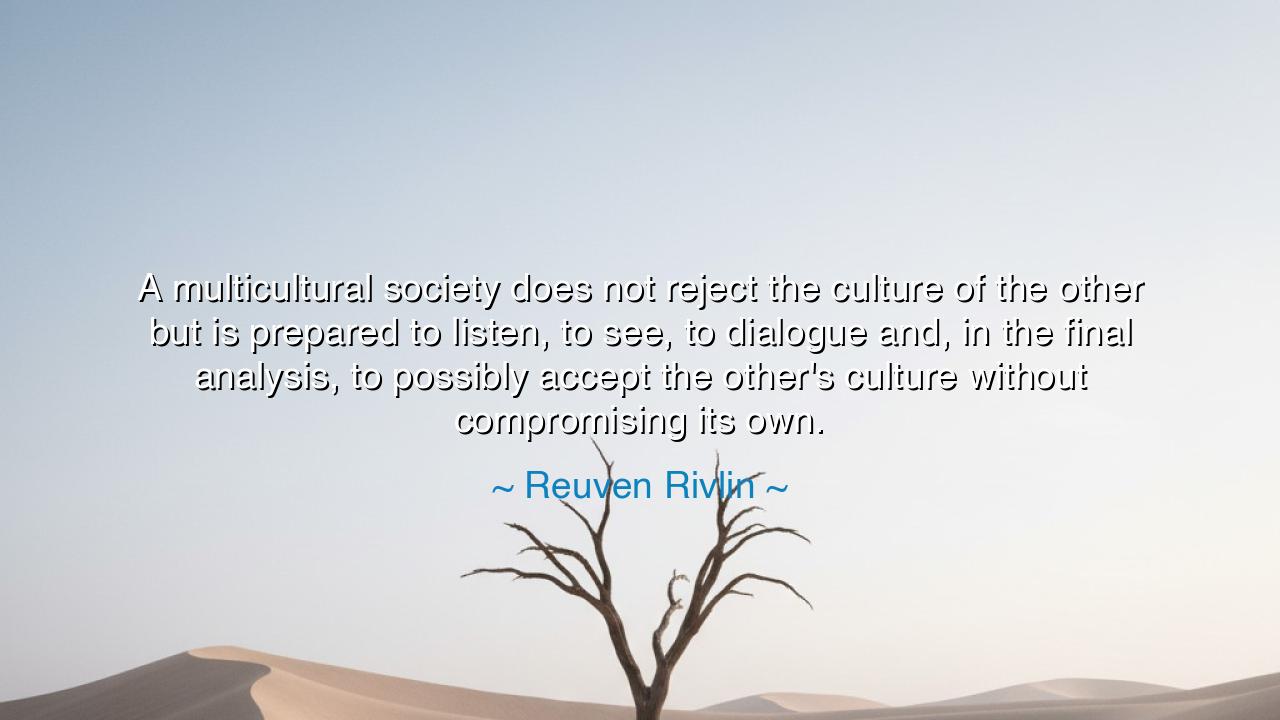
A multicultural society does not reject the culture of the other
A multicultural society does not reject the culture of the other but is prepared to listen, to see, to dialogue and, in the final analysis, to possibly accept the other's culture without compromising its own.






Reuven Rivlin, the former president of Israel and a voice for unity amid division, gave us these luminous words: “A multicultural society does not reject the culture of the other but is prepared to listen, to see, to dialogue and, in the final analysis, to possibly accept the other’s culture without compromising its own.” In this saying we hear not the voice of a politician alone, but the wisdom of an elder who has seen the dangers of hatred and the hope of harmony. It is a vision both fragile and powerful—that peoples of many traditions can dwell together, not by erasing themselves, but by learning to live in respect.
The meaning is clear and timeless: a multicultural society is not a melting pot in which every distinct flavor is lost, but a gathering of diverse voices, each carrying its own story, each offering its own song. To reject another’s culture is to close the gates of understanding, to cast away the possibility of peace. But to listen, to see, to dialogue, is to honor the shared humanity that beats beneath every tradition. Rivlin reminds us that to accept another does not mean to lose oneself; it means to grow wider, to grow deeper, to walk the world with eyes unshuttered.
History provides both warnings and shining examples of this truth. Consider the Ottoman Empire at its height. It stretched across lands of Greeks, Armenians, Arabs, Turks, Jews, and Kurds. Though imperfect and burdened with struggles, it often allowed each people to keep its faith, its language, its ways. Churches stood beside mosques; markets bustled with many tongues. This fragile balancing act gave the empire resilience, for it understood that domination alone cannot bind a people—only respect, however limited, can. Here was Rivlin’s teaching in practice: difference need not mean division, if there is a willingness to see and to listen.
Yet we must also recall the darker lesson of societies that failed. In Spain, after centuries of convivencia—when Christians, Jews, and Muslims lived side by side—the Inquisition demanded uniformity. Those who refused to surrender their faith were cast out or destroyed. What had once been a fertile ground of learning, science, and art became a land of suspicion and silence. Where there is no dialogue, where cultures are forced into conformity, the soil of creativity dries, and the spirit of a people withers. Thus, Rivlin warns us: the rejection of the other is not strength, but weakness disguised as purity.
The heart of his message is not tolerance alone, but courage. For it is no small task to sit before one who is different and truly listen, not with ears sharpened by judgment, but with the humility to learn. It is no small feat to accept aspects of another’s way while holding firm to one’s own. This requires wisdom greater than fear, and love greater than pride. It is the work of the strong, not the weak, to embrace the many while remaining true to oneself.
What lesson, then, do we carry? That we must train our hearts to see not enemies in difference, but fellow travelers. When you meet someone of another culture, do not shrink back into suspicion. Ask, listen, and let their story expand your own vision. Defend your heritage with dignity, but do not let it become a wall that blocks the view of others. This balance—of self-respect and openness—is the art of living in a multicultural society.
Practical action lies close to hand. Break bread with those of other faiths. Read their poets, hear their songs, walk in their festivals with reverence. Teach your children not to fear the strange, but to welcome it as part of the vastness of human life. And when disputes arise, choose dialogue over silence, and understanding over contempt. In this way, you practice Rivlin’s vision—not in theory, but in the marrow of daily living.
So let these words be your compass: the strength of a society is not in sameness but in the harmony of difference. A tree with many branches shelters more souls. A city with many voices is richer in wisdom. A heart that can both keep its own and accept another’s is the heart of peace. And it is peace—not uniformity—that endures the test of time.






AAdministratorAdministrator
Welcome, honored guests. Please leave a comment, we will respond soon